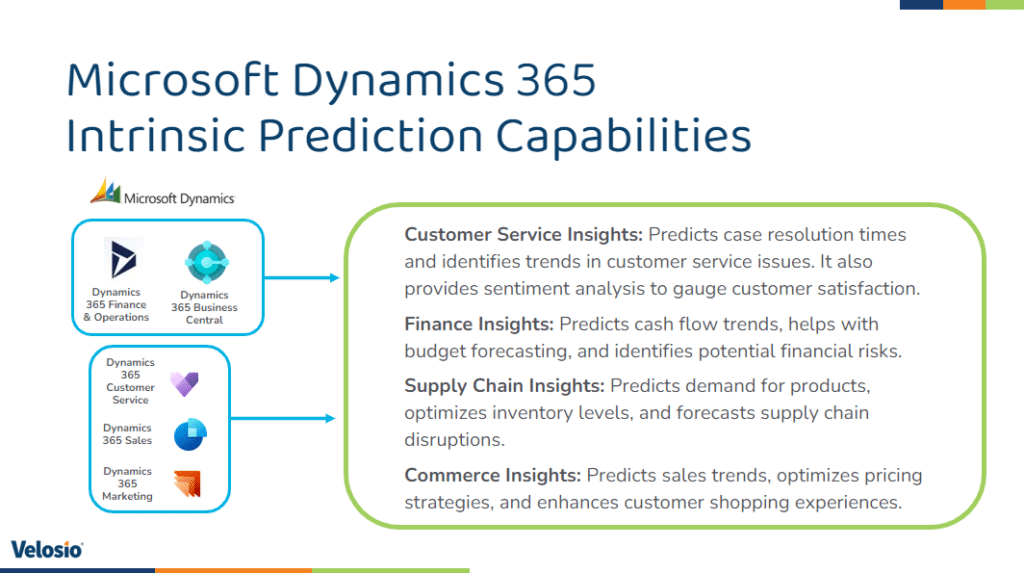Predictive Analytics Tools — Investment Trap or Revenue Generator?
Mid-market companies are at a crossroads: they need to scale and remain competitive but without the luxury of endless resources. Can they?

Trey Johnson
Data Analytics Solution SpecialistTable of Content
Mid-market companies face a unique set of challenges. From limited resources to siloed data and manual processes, staying ahead of the curve can feel like an uphill battle that leaves many relying on outdated methods to make critical decisions about sales, inventory, and customer retention — often with imprecise results.
This is where predictive analytics comes in to change the way decisions are made.
By leveraging predictive analytics, mid-market companies can not only overcome these challenges but also compete effectively with larger enterprises.
Predictive analytics uses data, statistical algorithms, and machine learning techniques to identify the likelihood of future outcomes based on historical data. Unlike a magic eight ball, this method relies on facts, patterns, and sophisticated models to forecast everything from weather to stock market trends — and most importantly for businesses, future sales.
Without predictive analytics, businesses are typically left relying on “gut feeling” or very limited data when making sales and inventory decisions.
This is like looking out the window to guess the weather for the entire week. Sure, it might look sunny now, but without detailed forecasts, you won’t know when the rain is coming.
Similarly, many companies look at their current pipeline or past performance to assume the next quarter will be great. But without diving into the full scope of available data and patterns, those assumptions often lead to imprecision — whether in sales, marketing, or operations.
Want to learn more about predictive analytics and how to take advantage of the unique opportunities mid-size businesses have to streamline operations, supercharge their sales pipeline, and create meaningful customer connections with AI and Microsoft? Click here to join our free Data-Driven Growth Series.
For mid-market companies, challenges are often rooted in resource limitations, siloed data, and a lack of visibility into customer behaviors. Predictive analytics offers a way to overcome these hurdles in multiple ways. Let’s take a look at just a few.
Predictive analytics helps anticipate customer demand, optimizing inventory levels, and reducing stockouts. This ensures that you’ll always have the right products available when customers are ready to buy, all while lowering holding costs.
With limited marketing budgets, mid-market companies often struggle to target the right customer groups efficiently. Predictive analytics dives deep into demographics, purchasing behaviors, and preferences, helping businesses create personalized marketing strategies that improve customer satisfaction and loyalty. Tailored messaging and offers can make every marketing dollar go further, driving engagement and conversion rates without overspending.
Losing customers is costly. Predictive models analyze past customer behaviors to help businesses design targeted retention strategies. Whether through personalized outreach or exclusive promotions, identifying at-risk customers allows companies to keep valuable clients from walking out the door — without needing a massive customer service team.
Not all leads are created equal and chasing leads that don’t convert isn’t a good use of your sales team’s time. Predictive lead scoring allows sales teams to focus their efforts on the highest-quality prospects, improving productivity and driving higher conversion rates. For companies without large sales teams, this level of efficiency is crucial for maximizing return on effort and investment.
Solutions like Dynamics 365 and Microsoft Fabric help businesses tap into native AI-driven capabilities.
For example, Dynamics 365 Sales and Dynamics 365 Customer Insights help prioritize leads and predict customer behaviors, making it easier to close deals and retain clients. Additionally, tools like Power BI integrate predictive results into everyday dashboards, giving teams real-time insights into their future sales potential.
For mid-market companies struggling with resource allocation and forecasting, these predictive insights provide a clear path to improving efficiency and profitability.

Mid-market companies are at a crossroads: they need to scale and remain competitive but without the luxury of endless resources.
Predictive analytics, especially through tools like Dynamics 365 and Microsoft Fabric, provides a cost-effective solution. These tools enable mid-market companies to unify their data, automate key processes, and generate actionable insights without the need for massive IT investments.
This technology doesn’t just help businesses stay afloat — it enables them to grow smarter, reduce inefficiencies, and drive more revenue.
To learn more, check out our free Data-Driven Growth Series where we’ll be sharing more ways to have to streamline operations, supercharge their sales pipeline, and create meaningful customer connections with AI and Microsoft.

Trey Johnson
Data Analytics Solution SpecialistTalk to us about how Velosio can help you realize business value faster with end-to-end solutions and cloud services.
"*" indicates required fields